- Home
- Jay Bonansinga
Shattered Page 14
Shattered Read online
Page 14
Helen’s whisper was choked with fear. “Could that be—?”
“Sshhh.” Reinhardt motioned for the two women to stay put, then turned and crept toward the northeast corner of the barn. Helen watched the detective vanish into shadows, heard his crunching footsteps abruptly halt.
The two women stood there, waiting for the investigator to return. At last, they heard his footsteps again, and saw him emerging from the shadows with a sheepish look on his face.
“Nobody there,” he said, joining the women at the double doors.
Something moved inside the barn again. A puff of air, some muffled shuffling noises. The threesome turned toward the door. The shuffling noises persisted. Helen gaped, a deer-in-the-headlights look on her face now, her voice suddenly getting stuck in her throat.
It sounded like—
The double doors burst open, the padlock catapulting into the air like a mortar.
A massive shadow leapt out.
The group disabled the detective first, Nurse White surprising him with a knife to his throat. He was fumbling for his .38 (which he kept taped to his right ankle) when the big woman slashed a half-inch-deep cut across the bottom of his Adam’s apple. Massive breast cleavage bouncing above her stained white togs, the nurse growled some inarticulate battle cry as Reinhardt staggered. Then she kneed the man in the groin, and the detective finally collapsed in a bloody mist of arterial spray.
Meanwhile the psychiatrist and Helen had finally snapped out of their horrified stupors. Dr. Boeski gasped, then whirled around and started running headlong toward the shadows of the neighboring landfill.
Helen Splet was backing away in the other direction in utter terror, her slender hand going to her mouth, muffling her agonized moaning and garbled attempt at speech. Another denizen of U-Store-It darted out of the shadows to her left. Knuckle crawling like a little baboon, chubby little pug-nosed face all screwed up with rage, Angel had a flexible motorcycle chain clutched in his sticky fists.
The chain whipped around Helen’s shins as she tried to turn and flee. She stumbled, sprawling across the pavement, her breath knocked out of her lungs.
The feral child loomed over her. Helen tried to crawl away but the chain came down hard on the back of her head. The greasy linkage dug deep into her skull, bouncing her cranium off the asphalt. Dynamite erupted in her brain, and Helen was mercifully knocked out, her last conscious thought a jumble of regret and recrimination toward her God. How could the Lord let something like this happen?
Unfortunately these final thoughts would vanish like ashes in the ether, forever unanswered, as the razor-sharp chain came down on her skull and neck.
In the meantime the psychiatrist had gotten a head start across the northern edge of the property, and now was frantically scaling the steep hill that bordered the adjacent junkyard. She had kicked off her one-inch Fendi heels, and now was scurrying barefoot up the slope, a distant vapor light providing a dramatic bit of theater to the struggle. She reached the top of the berm and saw an ocean of wrecked vehicles and discarded appliances stretching out before her, the dented metal mosaic like a vast chipped-enamel sea.
Dr. Boeski paused at the apex to catch her breath when the shot rang out.
The blast struck her right shoulder just above the deltoid ligament. It felt like a fist punching through her bone, spinning her on a wild axis in a blood cloud, right before the second round struck her left temple, turning her power off forever. The psychiatrist crumpled, tumbling down the ravine into a gully of broken glass.
Her body did not lie there unobserved for long.
A figure appeared almost instantly at the top of the hill above her. Silhouetted in the arc light, the man was dressed in drag. He was a little thick in the middle, his posture slightly stooped, but mostly of average height and build. He looked a little ridiculous in the tattered dress—a fifty-seven-year old amateur transvestite.
Henry Splet gazed down at the carnage, still drenched in sweat from his long journey. His .45 handgun, with its homemade silencer, was still smoking.
Other figures joined him. One by one, they came up over the rise like phantoms and stood with Henry, a conquering army, the other tenants of the secret warehouse: Angel, the feral child; Nurse White in her blood-spattered togs; the Circus Lady; Mister Klister; Arturo, the Graffitti Artist; the Hillbilly; and others. Over a dozen of them.
They stood there, side by side, gazing down at the lifeless doctor.
A quarter of a mile to the west, amid the squall of barking dogs, the owner of Amalgamated Salvage came out of his shack and gazed off to the west. A squat, hairy Italian with a linebacker’s neck, Sonny Massamore had been working on the last fingers of a bottle of Jim Beam and playing solitaire when he heard the two gunshots as plainly as church bells.
Now he was shoving his cell phone and his Glock nine into his jacket pockets as he raced over to his rust-pocked golf cart.
It took Massamore a little under a minute to wheel across the hardpacked road that bisected the junkyard. His little golf cart rattled over broken bottles and shredded tires, shaking him hard enough to crack his jaw. His heart pounded as he approached the westernmost edge of the yard.
He scudded the golf cart to a stop behind a tower of engine blocks and hopped out.
In that horrible, pregnant silence before Massamore noticed the body of Dr. Susan Boeski lying crumpled like a rag doll in the gully to his right, he saw two very odd things. The first was a sign way up at the crest of the hill, nailed to a fence separating his junkyard with the neighboring deserted farm. Somebody had doctored the faded, missing letters of the original United States Implement sign:
U STORE I T
The second oddity was a solitary figure standing at the top of the hill—a man in a torn dress—looking down upon the salvage yard like he was surveying his kingdom, like some cardboard Napoleon commanding an invisible army. He held a big handgun at his side, and was talking to himself.
All alone.
Talking.
To himself.
TWENTY-ONE
A thousand miles and a million light-years away, at precisely the same moment Henry Splet was starting to clean up his mess at the abandoned barn, Ulysses Grove locked himself inside the basement of his Virginia home, out of view of the surveillance officers. Clad only in a T-shirt, khaki pants, and sandals, his .44 Bulldog snug against his ribs in a shoulder holster, Grove was about to give himself over to Vida’s uganga.
It was something he had resisted for most of his life. He had resisted it as a child, growing up on the mean streets of Chicago with an eccentric Kenyan mother who insisted on dressing him in dashikis and putting chicken bones under his pillow. He had resisted it as a young, noncommissioned officer in the Army’s CID unit when he started having prophetic nightmares of body dumps and evil urges hiding in ordinary people. But now, as he pulled the shades on the cellar windows, and turned off the overhead fluorescents, he found himself longing to be in that zone again, that borderland between two worlds.
One world was ruled by science, logic, the laws of physics, and the statistical predictability of human behavior. The other was ruled by invisible forces, by angels and demons, by spiritual warfare. Grove could not yet articulate his role in this latter realm, but he was convinced now that he belonged in this no-man’s-land. His visions had taught him that. His mother’s beliefs had led him to this place.
Over the last hour he had gathered a very special assortment of raw materials from his home office, a sort of makeshift collection of sacraments, some of them unholy and profane, some strictly forensic. He chose key pages from the Ripper profile: the “High-probability Traits,” recorded in Grove’s tightly woven handwriting, scrawled in ballpoint on legal pads. He neatly folded these into an empty cardboard printer box. He threw in a plethora of other items: several five-by-seven photographs of the Ripper’s size-eleven triple-E shoe imprint stamped into a blood-streaked sidewalk at the Memphis scene; a close-up of the seventh victim’s lidless,
staring eyes; a wide angle of the body-dump along the river near Quincy. Also a small Ziploc bag with hair and synthetic fibers taken from the Davenport scene. Also numerous faxes of autopsy reports, DNA analyses, ballistics, latent prints, sketches of scene geography, trace residue tests, bloodspatter narratives, sweepings, dustings, ultraviolets, sonograms, X-rays, and tracings. All the most significant physical evidence. All of it went into that worn-out Hewlett-Packard box.
To these items he added a host of objects that even Grove would be hard-pressed to explain. He was operating on sheer intuition now. He threw in a faded happy-face decal that a serial killer had given to him during a prison interview, the empty rictus of a smile and black-dot eyes always reminding Grove of the empty soul of a killer. He threw in a chipped, hand-painted clown figurine that John Wayne Gacy had presented to him during the filming of a Court TV documentary. He threw in a small, desecrated crucifix recovered from the home of the Hillside Strangler—spattered with dried human feces like blackface on the tiny Jesus—an artifact that radiated malevolence.
With the lights off and the shades drawn, the basement was now completely dark.
For Kwanzaa last year, Vida had given Grove a dozen ritual candles made from Sudanese beeswax, each one a different earth tone, each of which Grove now lit, placing them, one by one, on the carpeted floor in a large circle about eight feet in diameter. Ordinarily he would have been embarrassed by what he was about to do. He felt no such emotion right now. The candles filled the darkness with flickering yellow light.
Grove settled down on the floor in the center of the circle, legs folded Indian style.
He put the red, white, and blue shipping box in front of him. He rooted out the amniotic sac, peeled the tissue off, then placed it on the floor by the box. As an afterthought, for reasons he would never fully understand, he took out the desecrated Jesus and laid it to his right. He put the macabre happy-face decal to his left, and the clown figurine behind him. He also fanned a number of documents around the periphery of the circle, including the stark black-and-white images of scourged victims, mangled eyelids, macro close-ups of pupils that looked like marbles in aspic. Also positioned in clear view were the footprints, fingerprints, and DNA prints of the Ripper, shed like the ghostly skins of a snake.
Picking up the caul, Grove unfolded it carefully, like a bride’s delicate veil. It crackled faintly, as though he were opening a sacred text whose binding had fossilized from neglect. It seemed to exhale a cloud of dust in his hands. He could smell the long-evaporated proteins like rancid cloves as he swallowed the last traces of fear and hesitation.
He put the caul over his head.
The first impressions that washed over him were odors. Memory is stirred best by the nose, and this memory was prenatal, genetic, primal—a sort of unconscious déjà vu—galvanized by the leathery, grassy musk of that caul. It was a complex smell, a miasma of bitter old cinnamon, cowhide, and just a trace of dried urine. The next impression was visual. As his one good eye adjusted to the darkness inside the caul he began to make out the faintest trace of light spots.
At first Grove thought these spots were simply artifacts on the backs of his own eyes, the kind of luminous dots that appear when one’s eyelids are abruptly shut. But these spots were a yellowish sepia color like van Gogh’s stars, and swam slightly in the blackness of the mask. Grove realized he was looking at the tiny flames of his mother’s ritual candles through the translucent membrane of her amniotic sac.
He focused his thoughts on the Mississippi Ripper, the hidden order to the murder scenes, the systematic torture, the meticulous clamping open of the eyes. He thought of the killer’s home, an ordinary house on an ordinary street, and he focused on a face, on the flesh-and-blood features of a face. He concentrated and concentrated and—nothing.
All he saw were flickering dots floating in the limbo of darkness.
He felt feverish, his face flushing hotly inside the caul. He closed his eyes again and concentrated harder on the Ripper’s face. What would it look like? Ugly? Handsome? Androgynous? Probably none of the above. This face was more than likely a banal, ordinary face. Come out, come out, wherever you are…whoever you are…whatever you are. In his imagination Grove conjured the Ripper’s features as a mere silhouette, a dark cut-out, like a two-dimensional caricature.
An image sparked in the darkness of Grove’s mind’s eye for the briefest instant.
The image was accompanied by a snippet of a sound, like a single flash frame in a movie unspooling in Grove’s brain. He jerked as though slapped in the face, blinking in the blind darkness.
It took him a moment to figure out what he had just seen, an image lingering like a ghostly after-negative on the back of his cornea: seeing through the eyes of someone buried alive, underground, in the dank, black earth with the worms and the roots….
Henry Splet was dragging the third and final body—his wife’s limp form—around the back of the barn, when he heard the first low, deep noises coming from inside the building. Actually the word building is insufficient. In Henry Splet’s fragmented, disjointed brain, the solitary old barn had transformed once again into a place from Splet’s past: the U-Store-It mini-warehouse complex.
In Henry’s gaze, the front of the barn had melted into the front of the self-storage warehouse, complete with its graffiti-stained steel entrance doors and boarded windows. To the left, in his mind’s eye, stretched the massive east building with its honeycomb of storage units. To the right, dominating the western horizon, lay the ramshackle Quonset-style structure that made up “the wing”—that squalid, slummy corridor where all of Henry’s personalities lived. The long tin building was now cloaked in moon shadows just as it was way back in the late sixties when Henry was a kid in Peoria and his dad would take him out to U-Store-It for disciplinary reasons.
At the moment however, a terrible noise was coming from inside this hallucinatory world.
Actually the word noise probably also lacks the proper impact. An animal in the wild will hear subsonic vocalizations, tremors in the air that will send all manner of alarm across the feral synapses. But the noise that was emanating from inside this imaginary complex was more like a disturbance of air currents, a stirring of stillness at the bottom of a well, a warning growl so low and deep and basso profundo that it sounded at first like a gigantic diesel gurgling to life.
Henry dropped Helen Splet’s corpse next to the others, which were neatly lined up on the gravel behind the complex like cordwood. He cocked his ear toward the noise. It sounded as though it came from inside “the wing” somewhere. Goosebumps slithered down Henry’s back, under his blood-spattered dress. He felt woozy, faint.
He willed himself to walk around to the front of the building.
His key slipped into the padlock. Rusty hinges screamed as he opened the doors and entered the building. He found the timer switch, and turned the dial to sixty minutes. A single overhead tube sputtered and flickered dull light down on the dirt floor of a rotting barn, but what Henry saw was the tiled foyer of a warehouse, with its long narrow corridors spreading off on either flank, lined with vertical accordion doors. The hallucination was a remnant of his childhood, a memory made real, as real as a Technicolor movie in his brain.
In reality there was only that barn, and Henry’s gruesome souvenirs, arranged in obsessive little piles and patterns in the spiderweb-clogged corners—those battered road cases containing his cameras, his surgical instruments, that tattered Barcalounger armchair, his canisters of film, boxes of pornography, and his vast, beloved collection of old yellowed Polaroids. But now, as always, he stood in that flickering horrible barn, and his head slumped, and he got very still as though he were sleeping standing up.
A voice pierced the silence in the imaginary corridor to Henry’s right: “There’s somebody new here.”
In his shattered brain, Henry saw the endless row of accordion doors illuminated by flickering candles. The ghost of Nurse White, a social services worker, a woman
who once took the young Henry Splet into protective custody, had materialized once again at the end of the hallway. She now stood like a phantom, staring balefully at Henry. “Did you hear what I said?”
“What do you want from me?”
“New tenant.” She jerked a thumb toward the service elevator. “Wants to see you.”
The low, sepulchral growling noises had risen, vibrating the air like the lowest stop of a vast pipe organ. They came from the elevator.
“Why me?” Henry wanted to know. He trembled convulsively, hands shaking out of control.
Nurse White let out a laugh, her pale cleavage rippling and jiggling. “Go find out for yourself.”
“Maybe I will, maybe I’ll just do that.” Henry’s voice was the voice of a frightened, brutalized little boy.
“What are you waiting for?” The nurse urged him with nod toward the elevator. “Go on.”
In his imagination Henry started toward that hideous elevator.
He approached the door with its scarred wooden slats. Henry could see through the slats into the pitch-black emptiness. He could smell the moldering, dusty stench of death wafting up from the sublevel.
He pulled open the door and stepped into the dilapidated elevator. The growling noises engulfed him, penetrating his skull as he slammed the lever down…and rode to the imaginary basement.
The cascade of imagery took Grove’s breath away.
At first it flickered across the back of his blind eye in staticky waves, a distant signal beyond his reach, a frequency not yet tuned to the proper wavelength. Very soon, though, he realized he was seeing something important in the fractured, jagged images coaxed out the void.
He felt himself rising up through dense, spongy geological sediments, leathery wings unfurling, enormous serpentine eyes blinking open in the ceaseless dark.

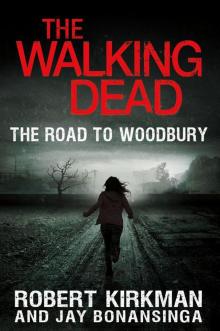 The Walking Dead: The Road to Woodbury
The Walking Dead: The Road to Woodbury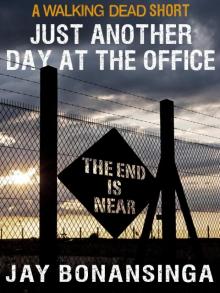 Just Another Day at the Office
Just Another Day at the Office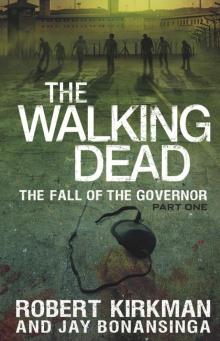 The Fall of the Governor: Part One
The Fall of the Governor: Part One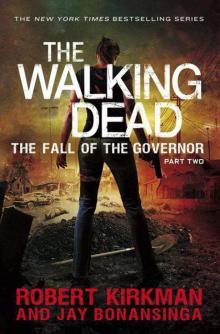 The Walking Dead: The Fall of the Governor: Part Two
The Walking Dead: The Fall of the Governor: Part Two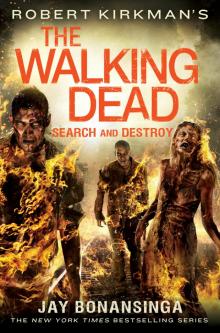 Search and Destroy
Search and Destroy Invasion
Invasion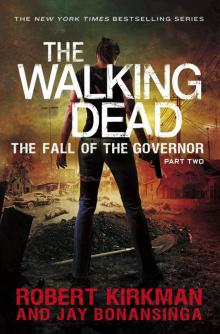 The Fall of the Governor: Part Two
The Fall of the Governor: Part Two The Walking Dead Collection
The Walking Dead Collection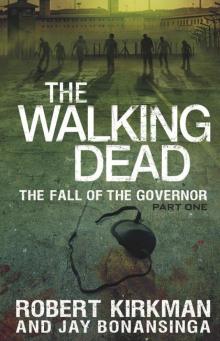 The Walking Dead
The Walking Dead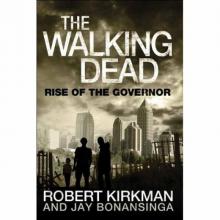 Descent
Descent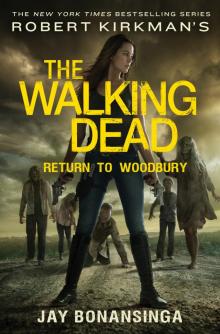 The Walking Dead: Return to Woodbury
The Walking Dead: Return to Woodbury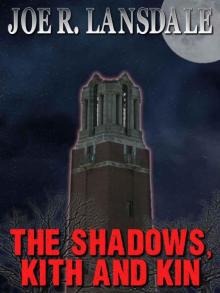 The Killer's Game
The Killer's Game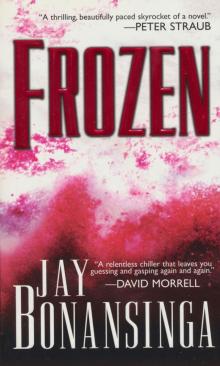 Frozen
Frozen Shattered
Shattered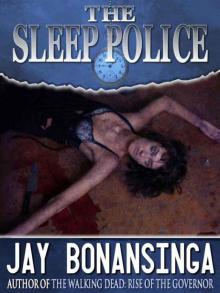 The Sleep Police
The Sleep Police Perfect Victim
Perfect Victim